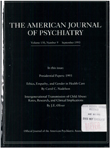The meaning of expressed emotion: theoretical issues raised by cross- cultural research
Abstract
The finding that expressed emotion is associated with the course of psychiatric disorder has generated a great deal of clinical and research interest in expressed emotion as an important risk factor. Theoretical elucidation of the construct of expressed emotion has lagged considerably behind this interest, however. The authors contribute to a dialogue on what is inside the "black box" called expressed emotion. They argue that cross-cultural research can provide an empirical basis for the theoretical grounding of expressed emotion factors. A comparative approach reveals that the construct of expressed emotion is essentially cultural in nature. The constellation of emotions, attitudes, and behaviors that are indexed by the expressed emotion method represent cross-culturally variable features of family response to an ill relative. Questions surrounding the cultural validity of the construct of expressed emotion, the qualitative dimensions of expressed emotion, and statistically significant cross- cultural variations in expressed emotion profiles are discussed. Finally, the authors provide an outline of diverse (cultural, psychobiological, social-ecological) features of expressed emotion. Anthropological analysis of expressed emotion reveals that although expressed emotion indexes a Pandora's box of diverse features, culture provides the context of variation through which these factors are most productively analyzed.
Access content
To read the fulltext, please use one of the options below to sign in or purchase access.- Personal login
- Institutional Login
- Sign in via OpenAthens
- Register for access
-
Please login/register if you wish to pair your device and check access availability.
Not a subscriber?
PsychiatryOnline subscription options offer access to the DSM-5 library, books, journals, CME, and patient resources. This all-in-one virtual library provides psychiatrists and mental health professionals with key resources for diagnosis, treatment, research, and professional development.
Need more help? PsychiatryOnline Customer Service may be reached by emailing [email protected] or by calling 800-368-5777 (in the U.S.) or 703-907-7322 (outside the U.S.).



